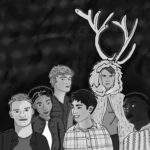Today I’m also over at Live, Love, Read with Kelly as part of her Musings of Eternal Dreamers feature, where I muse about writing a book and what it takes. Thanks for having me!!! How are your projects going?
on writing
Q: What makes a writer great?
A: The same things that make a book great. It’s subjective. So for me a great writer wants to write and loves to be immersed in their stories. I think that passion for storytelling shines through and is felt by the reader.
The Hardest Part about Writing a Book
In a word? Starting.
Starting is the absolute hardest part about writing a book. Everything after that is easy, even if parts can be frustrating or annoying.
So how do you start a book?
Give yourself permission. You don’t need permission from anyone else. Just yourself. When you’ve done that, sit down and write… and write… and write. Even if you trash it later and start over, you have to write. Without the words there is no story to share.
For me, I wanted to write Zaria’s story for a while. I knew Zaria Fierce as a character, but I didn’t know her story. I did a lot of world building for a school of misfit fairy tale children and archived it all, including the prologue and first chapter. Then I wrote her in a Beauty and Beast fairy tale setting where her kingdom was under attack. Hm… not that plot either. So I put those chapters aside.
What I did next was write about Zaria. I wrote her description, her character, and her background. She became a younger character at age 12 instead of age 16. It was amazing how quick it poured out of me. But I hesitated to keep going… I had two previous false starts. All I had now was Zaria. Who was the villain? What was the plot?
I set the story aside for a few months and returned to it when I found the villain. I ruminated about him for a long time. What was his name? What was his goal? Would he have powers and what would they be? When the villain came to me, he arrived fully form as a particularly nasty river-troll with an agenda. When I had Olaf the world built itself, but I would never have found the villain without having Zaria fleshed out.
It doesn’t matter where you start or how you arrive at your story. What matters is that you tell it.
Q: How would you like to grow as a writer?
A: I would like to get better at it all. I always believe that a talent can be improved upon. If I had to pick something specific then I would like to get better at narrative and voice first. I feel pretty comfortable with dialogue and world-building.
Q: What’s the hardest part about editing?
A: Finding and replacing the malapropisms within the text. They’re more difficult to spot than other errors because usually it is a real word sitting in the place of the correct word choice. Spellcheck won’t find it. Many readers will also skip over the malapropisms without seeing them, either because they don’t know better, or they do, and their mind replaced the word with the correct word instantly as they read the passage. Even after editing the book, I would still find malapropisms.
For example in the original text of Zaria Fierce and the Secret of Gloomwood Forest one of the characters said to another, “So we’re at a bypass then?” The real word is impasse (the point where progress is halted due to disagreements, lack of comprise, and physical barriers), not bypass (a road around a place, a reroute or detour to avoid something). As you can see, the words have two very different meanings and the sentence meaning changes depending on which one is used. The contextual clues would allow you to deduce what I really meant as the author, but it’s far better if I fix the malapropisms before you get your hands on the book. 🙂
Q: Where did you experience writer’s block in your book?
A: Probably wherever the story gets really clever. For instance, two moments that stick out to me in book one are when Zaria and her friends are imprisoned in Trolgar and what happens when Zaria, Olaf, and the Wild Hunt are on the scene for the delivery of the quest object. In the first, I had to answer how do they escape? It came by realizing how the room was already described. The solution was right there! For the second moment, I always knew there had to be a reason the mountain-trolls and the river-troll didn’t get along but would keep their distance. It couldn’t be just magic. I was reading the news when the idea of politics came to me as the solution. Sometimes the answer is in your face, you simply must step back and give your work a little space. Writer’s block to me is the inability to see the forest for the trees or the trees for the forest. Some space and a fresh look can make the big and small pictures appear.





